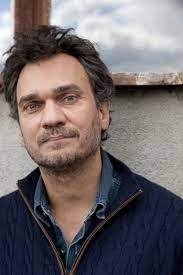Michael Hofmann, born in Freiburg into a family deeply rooted in literature, has become one of the most respected voices in poetry, translation, and literary criticism. His father, Gert Hofmann, was a celebrated German novelist, and his maternal grandfather edited the prestigious Brockhaus Enzyklopädie. Hofmann’s upbringing was shaped by a love for the written word, a passion that would go on to define his career.
Early Life and Education
Hofmann’s family relocated multiple times during his childhood, moving to Bristol in 1961 and later settling in Edinburgh. He attended Winchester College, a prestigious institution, before pursuing English Literature and Classics at Magdalene College, Cambridge, where he graduated with a BA in 1979. Post-graduation, Hofmann spent the next four years engaging in postgraduate study at the University of Regensburg and Trinity College, Cambridge, honing his literary skills and expanding his academic foundation.
Freelance Career and Teaching
In 1983, Hofmann embarked on a career as a freelance writer, translator, and literary critic. His work quickly gained recognition, and he was invited to hold visiting professorships at several esteemed universities, including the University of Michigan, Rutgers University, Barnard College, Columbia University, and the New School University. In 1990, Hofmann made his first visit to the University of Florida, later joining the faculty in 1994. By 2009, he became a full-time professor, where he has since led poetry and translation workshops, guiding a new generation of literary talent.
In 2008, Hofmann expanded his influence globally, serving as Poet-in-Residence in Queensland, Australia.
Literary Honors and Achievements
Hofmann’s work has been widely celebrated, earning him numerous accolades over the years. His debut collection, Nights in the Iron Hotel, garnered the Cholmondeley Award in 1984, followed by the prestigious Geoffrey Faber Memorial Prize in 1988 for his second collection, Acrimony. That same year, he won his first Schlegel-Tieck Prize for his translation of Patrick Süskind’s The Double Bass.
Hofmann has since received the Schlegel-Tieck Prize four more times, making him one of the most decorated translators of his generation. His translation of his father’s novel The Film Explainer won the Independent Foreign Fiction Prize in 1995, a recognition of his ability to bring works of German literature to an international audience.
In addition to these accolades, Hofmann’s translations of authors like Joseph Roth and Herta Müller have earned him the PEN/Book-of-the-Month Club Translation Prize, the Helen and Kurt Wolff Translator’s Prize, and the Oxford-Weidenfeld Translation Prize. His body of work as a translator is distinguished by its precision, depth, and the ability to capture the essence of the original text.
Most recently, Hofmann’s translation of Jenny Erpenbeck’s novel Kairos won the International Booker Prize in 2024, making it a landmark achievement as the first time the award went to a German writer and a male translator. This milestone cemented Hofmann’s reputation as one of the finest literary translators of his time.
In 2023, Hofmann’s contributions to literature were further recognized when he was elected a Fellow of the Royal Society of Literature, a testament to his enduring influence in the literary world.
A Fearless Critic
In addition to his poetry and translations, Hofmann is known for his fearless, often scathing literary criticism. Described by Maria Tumarkin as “masterful” and “convention-eviscerating,” Hofmann has never shied away from voicing his opinions. Philip Oltermann remarks on the “savagery” with which Hofmann critiques writers, living and dead. Hofmann’s disdain for Stefan Zweig, for example, is legendary. Oltermann likens Hofmann’s criticism to a “Soho drunk stumbling into the National Portrait Gallery in search of a good scrap,” delighting in battering posthumous reputations with the same zeal as those of contemporary writers.
Personal Life
Hofmann splits his time between Hamburg and Gainesville, Florida, and has two sons, Max (born 1991) and Jakob (born 1993). Though private about his personal life, Hofmann’s deep connection to both the U.S. and Germany is reflected in his diverse literary work, which spans continents and languages.




